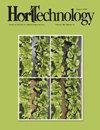佛罗里达州消费者和种植者对野生动物友好型植物的科学大学认证过程的态度和偏好
IF 1.3
4区 农林科学
Q3 HORTICULTURE
引用次数: 0
摘要
这篇文章分享了消费者和种植者提供的关于佛罗里达大学生物多样性认证植物的调查结果,该植物是在佛罗里达大学(UF)进行的快速扩展的城市景观市场项目。该项目的总体目标是开发和测试一种以科学为基础的、以uf为商标的过程,用于为绿色产业认证高质量、可商用、对野生动物友好的植物。两项调查分别针对消费者和种植者,目的是评估消费者和种植者对野生动物友好型植物和拟议认证的态度、知识和行为。消费者调查结果(n = 868)表明,受访者(消费者)强烈同意购买野生动物友好型植物,并且受访者将从拟议的认证中受益。该认证可以帮助消费者在购买时更好地了解哪些植物对野生动物无害。近一半的消费者报告说,他们无法在商店里识别对野生动物友好的植物,这阻碍了他们的购买。种植者调查结果(n = 75)表明,受访者愿意提供生物多样性认证的植物。在采用创新方面,更多的种植者将自己评为创新者(最具创新性的类别),而不是其他创新扩散类别(早期采用者、早期多数、后期多数、犹豫或没有),尽管获得认证的感知成本被视为种植者采用认证的潜在障碍。这些发现表明,如果对种植者和消费者都提供适当和量身定制的营销材料,拟议的认证将会取得成功。本文章由计算机程序翻译,如有差异,请以英文原文为准。
Attitudes Toward and Preferences of Florida Consumers and Growers Regarding a Proposed Scientifically Based University Certification Process for Wildlife-friendly Plants
This article shares survey results provided by both consumers and growers regarding the University of Florida Biodiversity Certified Plants for the Rapidly Expanding Urban Landscape Market project conducted at the University of Florida (UF). The overall goal of this project was to develop and test a scientifically based, UF-trademarked process for the certification of high-quality, commercially available, wildlife-friendly plants for the green industry. The objectives of two surveys that targeted consumers and growers, respectively, were to assess consumer and grower attitudes, knowledge, and behaviors pertaining to wildlife-friendly plants and a proposed certification. The consumer survey results ( n = 868) indicated that respondents (consumers) strongly agreed with purchasing wildlife-friendly plants, and that respondents would benefit from the proposed certification. The certification could help consumers gain a better understanding of which plants are wildlife-friendly at the point of purchase. Nearly half of consumers reported an inability to identify wildlife-friendly plants in the store, which hinders them from purchasing. The grower survey results ( n = 75) indicated that respondents were willing to offer biodiversity-certified plants. More growers rated themselves as innovators (the most innovative category) in terms of adopting innovations than any other diffusion of innovations category (early adopter, early majority, later majority, hesitant, or none of these), although the perceived cost of obtaining the certification was seen as a potential barrier toward grower adoption of the certification. These findings indicate that the proposed certification would be successful with appropriate and tailored marketing materials for both growers and consumers.
求助全文
通过发布文献求助,成功后即可免费获取论文全文。
去求助
来源期刊

Horttechnology
农林科学-园艺
CiteScore
2.30
自引率
10.00%
发文量
67
审稿时长
3 months
期刊介绍:
HortTechnology serves as the primary outreach publication of the American Society for Horticultural Science. Its mission is to provide science-based information to professional horticulturists, practitioners, and educators; promote and encourage an interchange of ideas among scientists, educators, and professionals working in horticulture; and provide an opportunity for peer review of practical horticultural information.
 求助内容:
求助内容: 应助结果提醒方式:
应助结果提醒方式:


